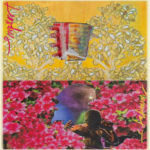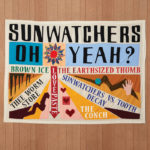In today’s genre-fluid landscape where a young trap rapper can do a country record and shift zillions, it’s easy to forget how deeply weird, even suspiciously confrontational, it once was to combine two disparate styles. “Death to disco shit, long live rock!” spat a headline in the first issue of Punk magazine, whilst rock shock jock Steve Dahl organised a mass blowing-up of records by the Bee Gees and their ilk at a major league baseball game. The charts were a tribal battleground, with white male middle America outraged that a genre populated by gays, women and people of colour had ousted them from their dominant spot in record stores.
Yet in New York, a small but revelatory label, ZE records, were experimenting with new cocktails of sound. An early signing, Cristina (born Cristina Monet-Palaci, who passed away of Coronavirus on April 1st this year, aged 61) was a Harvard graduate turned underwear model turned theatre critic who not only successfully married disco’s sparkle to punk’s nihilism, but also injected it with influences of Brechtian cabaret and an arch sense of humour. By her own admission, singing wasn’t her strong suit, but she simply devised a detached, sharply enunciated speak-sing style distinctly her own.
Cristina’s debut single, ‘Disco Clone’, was a dancefloor spoof ramped up to ridiculous, helium-huffing levels: featuring other vocalist Kevin Kline as a lascivious Saturday-night Romeo, Cristina breathily plays the troupe of generic babes he puts the moves on. Recalling the first time the label boss Michael Zilkha (who would later become her husband) played her the track, Cristina said, “ I told him, ‘That is, without a doubt, the worst song I have ever heard. It is so bad that the only way you could do it – which would actually be quite fun – would be as a kind of Brechtian pastiche.” And in those days, they weren’t really doing spoken disco records. And he said, “Well, do you want to give it a shot?” Because he knew I loved Brecht and Kurt Weill. And I said, “Why not?“
The record sets out a persona that would crop up again in a number of her future songs: twinklingly kitsch bimbette, undercut with a seething, acidic wit. As slinky and elegant as a panther and capable as being just as vicious a clawing Cristina was a quintessential no-wave chanteuse before no-wave had even really got going. Deadpan yet still decadent, she was a sex kitten with an unnerving intellect, a Marylin Monroe voice channelling Dorothy Parker thoughts.
Cristina’s oeuvre is slim yet potent. Her eponymous 1980 debut album (later re-titled Doll In The Box on reissue) was produced by August Darnell (AKA Kid Creole, who would later be responsible for another underrated disco classic, Dr Buzzard’s Original Savannah Band’s self titled LP) and his polish is evident in the glossy, cinematic orchestration and latin-inspired syncopated rhythms. It’s Cristina’s perfectly suited delivery, though, swinging from dry cynicism to campy savagery that pushes the whole thing to another level. ‘Mama Mia’ (not an Abba cover, I should point out) writhes wildy, building to the point of mania as the song’s protagonist spins out of control. ‘Don’t Be Greedy’ drips in frustration, the narrator taunting a philandering boyfriend that he’s just not a good enough lover to be worth sharing over frantic bongos and handclaps: “I was never satisfied by you / So how do you expect to handle two?”
The follow-up 1984 album Sleep It Off saw Darnell swapped for Don Was (of Was Not Was fame), and resulted in a spikier, more guitar-heavy sound – the chilly, bracing morning-after to the previous album’s humid heavy-petting. If anything, the vocals are even more lacerating than before, with added Johnny Rotten snarls: Highlights include ‘Ballad Of Immoral Earnings’, a woozy reworking of a Kurt Wiell/Bertold Brecht number from The Threepenny Opera with lyrics about toilet abortions and controlling lovers – “I’m going to pawn your skirt /a skirt is nice, but no skirt is ok too” – and the metallic synthesiser squawks in ‘What’s A Girl To Do’, with Cristina dementedly vamping over the top like a sexbot who’s become sentient and turned on her owner, “My thighs are black and blue /My sheets are stained, so is my brain /What’s a girl to do?”
The two songs she is perhaps best known for are amongst her very darkest. A brilliantly acerbic cover of Lieber & Stoller’s ‘Is That All There Is’ gets new lyrics about how the boy from Manhattan “beat me black and blue…and I loved it”. The result is somewhat startling – so much so, that Lieber and Stoller sued and stopped it being the hit single it might have (and definitely should have) been. And then there’s her (anti-)Christmas anthem, ‘Things Fall Apart’. There are actually two different recordings of this, each with slightly different lyrics. Between them, financial destitution, heartbreak, isolation, suicide, and references to another work about female mental fragility, Jean Rhys’s 1939 novel Good Morning Midnight, are all listlessly discussed over a sawtooth guitar, as if by a trauma victim still in shock. Truly, this is the festive song for people who hate festive songs.
Sadly, despite glowing reviews, neither album garnered much commercial success. Cristina suffered a crisis of confidence, gave birth to a daughter and shifted base from New York to Texas. She developed a multiple-sclerosis-like condition, but took up writing again, becoming a contributor to the Times Literary Supplement. She was lured back into the recording studio only once, in 2006 by New York producer Ursula 1000 to provide vocals on ‘Urgent/Anxious’, which bears all the sour seductiveness of her previous work. She later came to terms with her niche appeal, quipping wryly in an interview, “I always said I was a drag queen. No wonder the label dropped me! I had homosexual fan clubs in the theater departments of Ivy League schools. Ooh boy, that’s chart-busting stuff”.
Zola Jesus, upon hearing of her death, stated Cristina had been a huge influence on her own work, calling her “too weird for the pop world and too pop for the weird world.” It seems that the mainstream, even today still struggling to not put female performers in pre-determined boxes, was not ready for a scathingly droll beauty who sang songs with perky melodies and lyrics about fallen women and faded glamour, sodden with booze and sex and death. But if any good can come from her passing, it would be that the publicity draws attention to her back catalogue (all currently streaming on Spotify) and introduces her to new fans. As Cristina herself once said, “Yesterday’s kitsch is tomorrow’s antique”.




